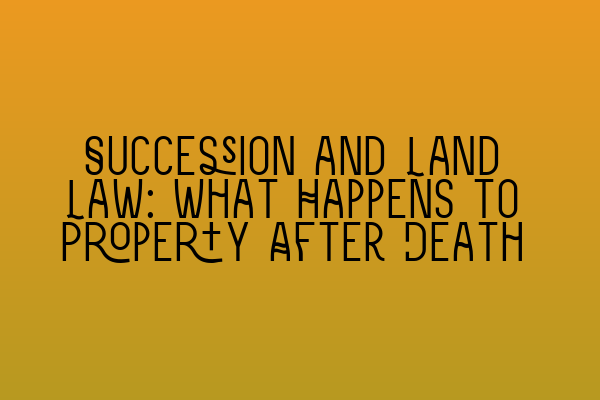Succession and Land Law: What Happens to Property After Death
When it comes to property ownership and succession, understanding the laws and regulations regarding the transfer of property after death is crucial. Succession and land law govern how property is distributed to heirs or beneficiaries after the property owner passes away. In this article, we will explore the key concepts and processes involved in succession and land law, providing you with a comprehensive understanding of what happens to property after death.
What is Succession and Land Law?
Succession and land law are branches of law that deal with the transfer of property rights after the owner’s death. These laws ensure a smooth transition of property ownership from the deceased to their heirs or beneficiaries. The laws vary from country to country, so it is essential to consult with a solicitor who specializes in property law to ensure compliance with the legal framework of the jurisdiction in question.
Intestate Succession
In cases where a person dies without a valid will, known as dying intestate, the laws of intestate succession come into play. These laws determine how the deceased’s property will be distributed among their heirs based on predefined rules set by the legal system. The rules generally prioritize immediate family members, such as spouses, children, and parents, in that order. However, the specific distribution may vary depending on the jurisdiction.
It is crucial to note that intestate succession may not align with the deceased’s intended wishes for the distribution of their property. To avoid such situations, it is always recommended to create a valid will that clearly outlines the desired distribution of assets.
Testate Succession
Testate succession occurs when a person passes away with a valid will. The will specifies how the deceased’s property should be distributed after their death, including any specific bequests or instructions. The appointed executor of the will is responsible for carrying out the wishes outlined in the document.
A will must meet certain legal requirements to be considered valid. These requirements typically include being of sound mind, having the will in writing, and signing it in the presence of witnesses. Failing to meet these requirements could render the will invalid, leading to intestate succession or legal disputes.
Grant of Probate
When a person passes away with a valid will, the appointed executor must apply for a grant of probate. A grant of probate is a legal document that confirms the executor’s authority to administer the deceased’s estate, including the distribution of property to the beneficiaries according to the terms of the will.
The grant of probate ensures that the deceased’s wishes are carried out correctly and provides legal protection to the executor. It also allows for the transfer of legal ownership of the property to the beneficiaries, enabling them to deal with the property as they see fit.
Challenges to Succession
Succession can sometimes be disputed, leading to legal challenges. These challenges may arise due to various reasons, such as:
- Claims of undue influence or coercion in the creation of the will.
- Allegations of the testator lacking the mental capacity to create a valid will.
- Challenges to the appointed executor’s suitability or conduct.
- Disputes regarding the interpretation of the will’s provisions.
In such cases, interested parties can contest the distribution of property, leading to court proceedings to resolve the disputes. It is always advisable to seek legal assistance from a solicitor experienced in succession law to navigate these challenging situations.
Conclusion
Succession and land law play a critical role in determining what happens to property after death. Whether a person dies testate or intestate, understanding these laws is essential to ensure the smooth transfer of property ownership to the intended beneficiaries or heirs.
If you have any questions or require legal advice regarding succession and land law, do not hesitate to contact our team of expert solicitors at SQE Property Law & Land Law. We specialize in property law matters and can provide you with the guidance and assistance you need.
